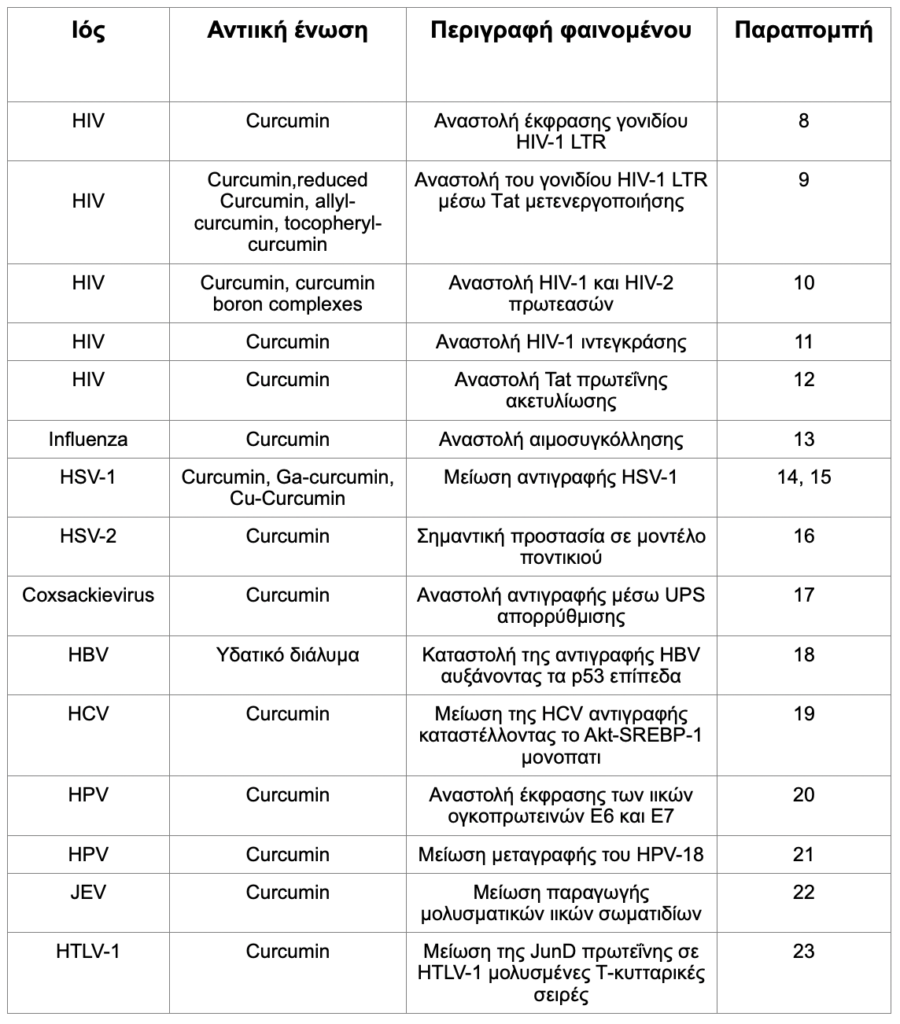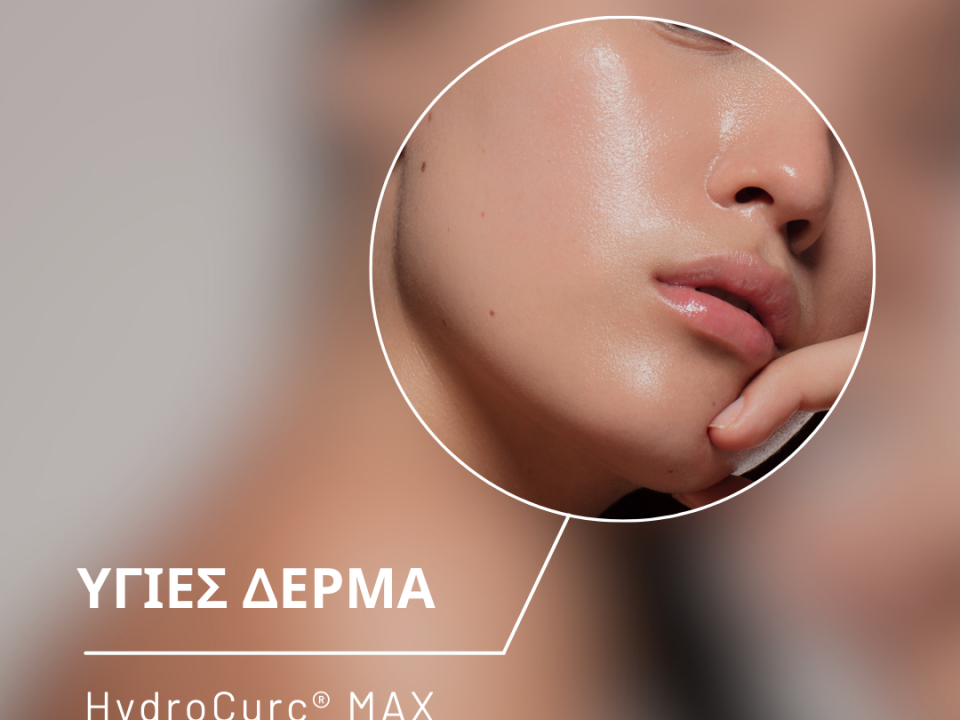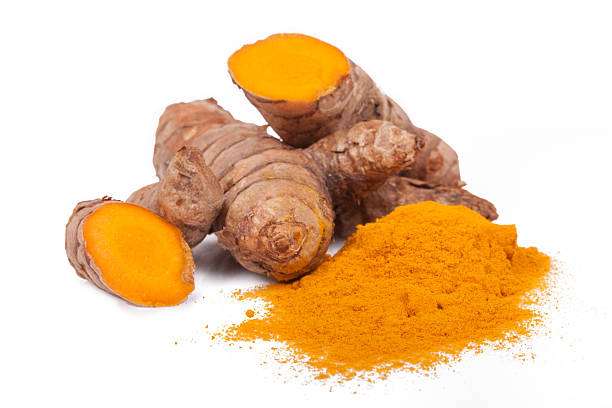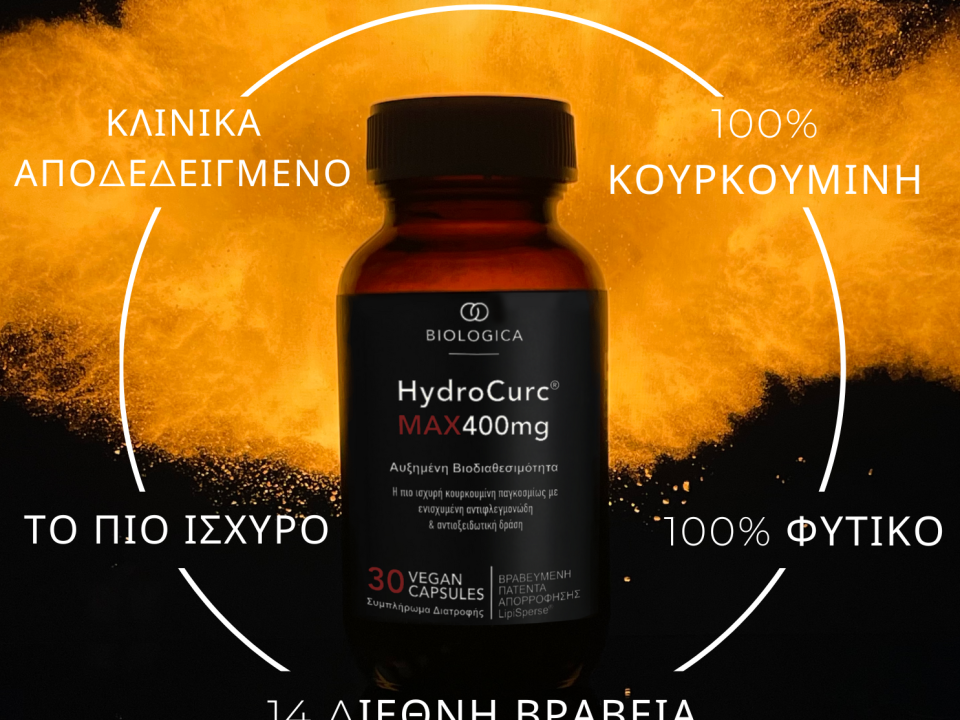Ένα άρθρο του Κουτουλογένη Σ. Γεώργιου Χημικός, Διδάκτορας Οργανικής Χημείας, Τμήμα Χημείας, ΕΚΠΑ.
Η κουρκουμίνη ως αντιμικροβιακός παράγοντας ενισχύει το ανοσοποιητικό σύστημα.
1. Εισαγωγή
Η αντιφλεγμονώδης δράση της κουρκουμίνης είναι ευρέως γνωστή σε όλον τον κόσμο και έχει περιγραφεί σε παλαιότερο άρθρο αναλυτικά. Στο συγκεκριμένο άρθρο θα γίνει αναφορά στην αντιική, αντιμυκητιακή και αντιβακτηριδιακή δράση της κουρκουμίνης, αλλά και στην δράση κατά της ισταμίνης και των αρνητικών επιπτώσεων της αλλεργίας.
Το φυτό και η κουρκουμίνη, η οποία είναι μια πολυφαινολική ένωση, έχουν υποστεί ποικίλες μελέτες για την αντιμικροβιακή τους δράση, καθώς έχει αναφερθεί ότι στο παρελθόν οι γηγενείς χρησιμοποιούσαν τον κουρκουμά ευρέως για τις θεραπευτικές του ιδιότητες. Τα υποσχόμενα αποτελέσματα που παρουσίασε η κουρκουμίνη κατά την διάρκεια διαφόρων αντιμικροβιακών μελετών την καθιστούν μία καλή υποψήφια χημική ένωση για ταυτόχρονη λήψη ως συμπληρωματικό φάρμακο με αρκετούς αντιμικροβιακούς παράγοντες για την καταπολέμηση ιών, μυκήτων και βακτηρίων. Στην συνέχεια θα παρατεθούν ενδεικτικές μελέτες που ενισχύουν την ιδιότητα της κουρκουμίνης ως ένα φυσικό αντιμικροβιακό παράγοντα [1], καθώς και θα γίνει μια αναφορά της δράσης της κουρκουμίνης κατά της έκκρισης της ισταμίνης και πως αυτό βοηθά τον οργανισμό και το ανοσοποιητικό σύστημα.

Ο κουρκουμάς χρησιμοποιούταν από το μακρύ παρελθόν ως αντιμικροβιακός παράγοντας, καθώς και ως εντομοαπωθητικό. Στις μέρες μας αρκετές μελέτες και κλινικές δοκιμές έχουν δείξει το ευρύ φάσμα της αντιμικροβιακής ιδιότητας της κουρκουμίνης κατά βακτηρίων, ιών και μυκήτων. Κλινικές δοκιμές έχουν δείξει ότι εξαιτίας της εκτεταμένης αντιμικροβιακής δράσης της κουρκουμίνης και της ασφαλούς λήψης έως και 12 γρ. ανά ημέρα, η κουρκουμίνη χρησιμοποιήθηκε ως πρότυπο δείγμα για την σύνθεση και ανάπτυξη νέων ενώσεων παρόμοιας δομής με τροποποιήσεις για την ανεύρεση νέων αντιμικροβιακών παραγόντων με καλύτερη δράση [2, 3].
Η κουρκουμίνη είχε μελετηθεί ακόμα και για την αντιμικροβιακή της ικανότητα μέσω επικάλυψής της σε υφασμάτινα υλικά. Για παράδειγμα, βαμβάκι εμβαπτισμένο με κουρκουμίνη έδειξε καταπολέμηση 45% και 30% κατά των βακτηριακών στελέχων Staphylococcus aureus και Escherichia coli [4]. Έχει αναφερθεί επίσης ότι μίγμα κουρκουμίνης με νανοσωματίδια αργύρου έχει χρησιμοποιηθεί για την ανάπτυξη αντιμικροβιακών δερματικών gel και μικκυλίων που παρουσιάζουν βελτιωμένη προστασία του δέρματος και επούλωσης πληγών. Με νανοποσότητες παρουσιάστηκε μέχρι και 50% καταπολέμηση του βακτηρίου του σταφυλόκοκκου [5].
2. Αντιβακτηριδιακή Δράση Της Κουρκουμίνης.
Οι βακτηριδιακές μολύνσεις και φλεγμονές είναι από τις πιο σημαντικές μολυσματικές ασθένειες. Με πάνω από 50 χρόνια μελετών κατά βακτηριακών ασθενειών η ανάγκη για εύρεση νέων φαρμάκων και παραγόντων είναι άμεση.
Η αντιβακτηριδιακή δράση υδατικού διαλύματος της ρίζας Curcuma Longa επέδειξε εξαιρετικά αποτελέσματα κατά του Staphylococcus aureus με μόλις 4g/L. Επίσης 24 διαφορετικά παραδείγματα βακτηρίων του κοτόπουλου και της γαρίδας δείχνουν την ισχυρή αντιβακτηριδιακή δράση της κουρκουμίνης.
Η δράση αυτή της κουρκουμίνης έχει παρατηρηθεί σε αμέτρητες περιπτώσεις από τις οποίες ορισμένες θα αναφερθούν ενδεικτικά. Μόλις 0.3% (w/v) προσθήκη υδατικού διαλύματος κουρκουμίνης σε τυρί έδειξε την συντριπτική πτώση των βακτηρίων Salmonella typhimurium, Pseudomonas aeruginosa και E. Coli. Επίσης, μελέτη πάλι σε τυριά δείχνει την πτώση σε επιμόλυνση των βακτηρίων Staph. aureus, B. cereus και Listeria ύστερα από 14 ημέρες αποθήκευσης στο ψυγείο.
Όπως είναι αντιληπτό όταν αυτά τα βακτήρια εισέλθουν στον οργανισμό του ανθρώπου, με λήψη κουρκουμίνης η καταπολέμηση των βακτηριακών στελεχών λαμβάνει χώρα [1].
Μια άλλη αντιβακτηριδιακή εφαρμογή της κουρκουμίνης είναι αυτή κατά του ελικοβακτηριδίου του πυλωρού.Το ελικοβακτηρίδιο του πυλωρού είναι το πλέον διαδεδομένο βακτήριο στον κόσμο και ένας στους δύο Έλληνες το φέρει. Τα συμπτώματα του συγκεκριμένου βακτηρίου είναι αρκετά δυσάρεστα και η χρήση αντιβιοτικών είναι αναγκαία για αρκετό χρονικό διάστημα. Η λήψη κουρκουμίνης έδειξε σημαντική μείωση του συγκεκριμένου στελέχους με ελάχιστη συγκέντρωση δράσης (MIC) μόλις 50 μg/mL απέναντι σε 65 διαφορετικές κλινικές περιπτώσεις ελικοβακτηριδίου. Αναφορές για τη συνολική δράση της κουρκουμίνης κατά του πλέον φλεγμονώδους βιοχημικού σηματοδοτικού μονοπατιού NF-kB έχουν γίνει σε προηγούμενο άρθρο. Αυτό που αξίζει να σημειωθεί στο συγκεκριμένο σημείο είναι ότι πληθώρα βακτηριακών περιπτώσεων καταπολεμώνται μέσω της αναστολής του συγκεκριμένου μονοπατιού.
3. Αντιμυκητιακή δράση της κουρκουμίνης.
Ουσίες, βότανα και εκχυλίσματα από διάφορες φυσικές πηγές και ειδικά απο φυτά καθιστούσαν πάντα ένα οπλοστάσιο για την αντιμετώπιση μυκητιακών παθήσεων. Λόγω της χρήσης του κουρκουμά στα τρόφιμα, έγιναν αρκετές έρευνες για την περίπτωση ελέγχου φθοράς και παθογόνων τα οποία προέρχονται από μύκητες. Μια μελέτη όπου προστέθηκε σκόνη από κουρκουμά σε νερό, έδειξε ότι δεν αναπτύχθηκαν καθόλου αποικίες μυκήτων με μόλις 0.8-1.0 g/L [1]. Όταν ο κουρκουμάς εκχυλίσθηκε με μεθανόλη, το εκχύλισμα επέδειξε άριστη δράση κατά των μυκητιακών στελεχών Cryptococcus neoformans και Candida albicans με ελάχιστη συγκέντρωση αναστολής 128 και 256 μg/mL αντίστοιχα. Το αντίστοιχο εκχύλισμα από εξάνιο με συγκέντρωση 1000mg/L απέδωσε και αυτό αρκετά καλή δράση κατά των στελεχών Rhizoctonia solani, Phytophthora infestans και Erysiphe graminis.Κουρκουμίνη και λάδι από τον κουρκουμά παρουσίασαν και αυτά με την σειρά τους ικανοποιητική δράση ενάντια στα τρία στελέχη. Σε μια περίπτωση αξίζει να σημειωθεί ότι η κουρκουμίνη παρουσίασε μεγαλύτερη εξάλειψη κατά του Paracoccidioides brasiliensis, απ’ότι το φάρμακο fluconazole. Ο πιθανός μηχανισμός κατά της συγκεκριμένης περίπτωσης ήταν η μείωση των επιπέδων του ενζύμου Δ δεσατουράση (ERG3) που οδηγεί σε σημαντική μείωση της εργοστερόλης στα κύτταρα του μύκητα, όπου και τελικά επέρχεται ο θάνατος των κυττάρων λόγω της συσσώρευσης ενεργών μορφών οξυγόνου (ROS: reactive oxygen species) [6].
Η ισχυρή αντιμυκητιακή δράση της κουρκουμίνης και οι χαμηλές παρενέργειες της ήταν οι κύριοι λόγοι για τους οποίους η κουρκουμίνη εξετάσθηκε για τη συνεργιστική της δράση με άλλα αντιμυκητιακά φάρμακα. Όταν η κουρκουμίνη δρούσε συνεργιστικά με φάρμακα κατά των μυκήτων όπως είναι τα voriconazole, itraconazole, ketoconazole, miconazole, fluconazole, amphotericin B και nystatin τα ελάχιστα επίπεδα που χρειάζονται για την καταστολή του υπό εξέταση μύκητα έπεσαν κατά 10-35 φορές στην περίπτωση του C. Albicans. Η μελέτη 200 απομονωμένων στελεχών Candida, όπως τα C. tropicalis, C. kefyr, C. krusei, C. guilliermondii, C. glabrata, C. Parapsilosis και C. albicans επέδειξαν αντιμυκητιακή δράση της κουρκουμίνης με MIC 32-128 μg/mL. Μια άλλη μελέτη έδειξε ότι κουρκουμίνη και ασκορβικό οξύ (Vit C) όταν εξετάσθηκαν κατά διαφόρων στελεχών της οικογένειας Candida, παρουσίασαν 5-10 φορές μικρότερες MIC τιμές σε σχέση με τα πειράματα που εξετάσθηκε η κουρκουμίνη μόνη της [7].
Συμπερασματικά είναι αντιληπτό ότι η κουρκουμίνη όταν δρα ταυτόχρονα με φάρμακα κατά των μυκήτων ενισχύει πολλαπλασιαστικά και συνεργιστικά την αντιμυκητιακή δράση των χορηγούμενων φαρμάκων.
3. Η κουρκουμίνη κατά διαφόρων ιών.
Η έλλειψη αποτελεσματικών θεραπειών για τους περισσότερους ιούς, η ανθεκτικότητα που παρουσιάζουν οι ιοί ανά τα έτη στα φάρμακα και το υψηλό κόστος των θεραπειών για αρκετές περιπτώσεις ιών, έχει προκαλέσει την ανάγκη ανακάλυψης νέων αντιικών φαρμάκων. Οι επιστήμονες τον τελευταίο αιώνα έχουν δείξει τεράστιο ενδιαφέρον για την ικανότητα που έχουν αρκετά φυτά στην καταπολέμηση ιών, με διαφορετικό μηχανισμό κάθε φορά. Συνεπώς και η κουρκουμίνη δεν θα μπορούσε να λείπει από το ενδιαφέρον των επιστημόνων, έχοντας ένα τόσο αρκετά βιολογικό ενδιαφέρον ως μόριο, παρουσιάζοντας αμετρήτες ευεργετικές ιδιότητες. Στον παρακάτω πίνακα φαίνονται ενδεικτικά μερικές περιπτώσεις όπου η κουρκουμίνη παρουσιάζει αντιική δράση, ενισχύοντας με αυτόν τον τρόπο το ανοσοποιητικό σύστημα (Πίνακας 1). Και σε αυτό το σημείο πρέπει να αναφερθεί η σημασία του NF-kB, Nrf-2 βιοχημικού συστήματος που έχει επεξηγηθεί σε προηγούμενο άρθρο για τον τρόπο δράσης της κουρκουμίνης κατά των ιών.

3.1. Η κουρκουμίνη ως πιθανός αναστολέας του SARS-CoV-2
Στα πλαίσια της πανδημίας COVID-19 που έχει εξαπλωθεί εδώ και έναν ολόκληρο χρόνο αξίζει να δεί κανείς τις ιδιότητες που έχει η κουρκουμίνη ως ένα μόριο που επιδεικνύει και αντιική δράση ανάμεσα στις πολλές ευεργετικές ιδιότητες της [24].Συνολικά, η κουρκουμίνη διαθέτει αντιφλεγμονώδεις, αντιοξειδωτικές, ανοσορυθμιστικές, καθώς και πνευμονοπροστατευτικές ιδιότητες (βλ. άρθρο ‘’Η κουρκουμίνη και οι θεραπευτικές της ιδιότητες!’’) με αποτέλεσμα να φαντάζει έναν καλό υποψήφιο ως κατευναστικό της νόσου ή και αποτελεσματικού καταστολέα της. Από την στιγμή που η κουρκουμίνη έχει γνωστή ανασταλτική ιδιότητα του NF-kB σηματοδοτικού μονοπατιού και αρκετών φλεγμονοδών κυτοκινών, είναι πολύ πιθανό να καταπολεμήσει σε έναν βαθμό την ‘’καταιγίδα επιβλαβών κυτοκινών’’ που προκαλεί ο SARS-CoV-2. Επίσης ως υποδοχέας Michael, είναι πολύ πιθανό να αναστέλλει την κύρια πρωτέαση (M pro) του κορονοϊού SARS-CoV-2 αντιδρώντας με κρίσιμα κατάλοιπα κυστεινών. Τέλος, η κουρκουμίνη παρουσιάζοντας μηδενικές παρενέργειες, μπορεί να λαμβάνεται και ως προληπτικό μέσο, έως ότου γίνουν κλινικές δοκιμές στο μέλλον για να αποδειχθεί ή όχι η αποτελεσματικότητά της κατά της πανδημίας.
4. Κουρκουμίνη κατα της ισταμίνης.
Η κουρκουμίνη ως μια πολυφαινολική φυτοχημική ουσία με αντιφλεγμονώδεις, αντιαμυλοειδείς, αντισηπτικές, αντικαρκινικές και αντιοξειδωτικές ιδιότητες έχει αναφερθεί και για την δράση της κατά της αλλεργίας με ανασταλτική επίδραση στην απελευθέρωση της ισταμίνης από τα ιστιοκύτταρα. Η αποτελεσμαστικότητα της κουρκουμίνης στην αλλεργία και το άσθμα έχει διερευνηθεί χρησιμοποιώντας ένα μοντέλο ποντικού. Τα αποτελέσματα δείχνουν μια σημαντική αναστολή της αλλεργικής απόκρισης σε ζώα που έλαβαν κουρκουμίνη, καθιστώντας έτσι την κουρκουμίνη πρωταρχικό παράγοντα για την μείωση της αλλεργικής απόκρισης. Η κουρκουμίνη έχει παρουσιάσει ότι μπορεί να αντιμετωπίσει καταστάσεις σχετιζόμενες με την αλλεργία, όμως πρέπει να γίνουν και άλλες μελέτες στο μέλλον για την εξακρίβωση της αντιμετώπισης της αλλεργίας στον άνθρωπο [25].
Η κουρκουμίνη είναι ένα φυσικό προϊόν με ποικίλες ευεργετικές ιδιότητες κατά ιών, μυκήτων και βακτηρίων, καθιστώντας έτσι τον οργανισμό ‘’ετοιμοπόλεμο’’ να ανταπεξέλθει σε οποιαδήποτε πιθανή μόλυνση του από παθογόνο μικροοργανισμό.
Πέραν του γεγονότος ότι διαθέτει τις ιδιότητες αυτές ως μόριο από μόνο του, η κουρκουμίνη μπορεί να δράσει συνεργιστικά και με άλλες φαρμακευτικές ουσίες για κάθε περίπτωση ξεχωριστά ενισχύοντας έτσι την συνολική δράση κατά του μικροοργανισμού. Μια άλλη πολύτιμη ιδιότητα που διαθέτει η κουρκουμίνη είναι η δράση της κατά της ισταμίνης και η αντιμετώπιση αλλεργικής αντίδρασης στα ποντίκια.
Τέλος, αξίζει να σημειωθεί ότι οι παρενέργειες της κουρκουμίνης είναι εξαιρετικά χαμηλές, όπως έχουν συμπεράνει αρκετές κλινικές μελέτες.
ΒΙΒΛΙΟΓΡΑΦΙΑ
- Zandi K. et al. A Review on antibacterial, antiviral and antifungal activity of Curcumin. Biomed. Res. Int. 2014; DOI: 10.1155/2014/186864.
- LaColla P. et al. Curcumin-like derivatives with potent activity against HIV-1 integrase: synthesis, biological evaluation and molecular modeling. Antiviral Research. 1998; 37(3): 57-57.
- Anand P. et al. Bioavailability of curcumin: problems and promises. Molecular Pharmaceutics. 2007; 4 (6): 807-818.
- Han S. et al. Antimicrobial activity of wool fabric treated with curcumin. Dyes and Pigments. 2005; 64 (2): 157-161.
- Liu C. H. et al. Antimicrobial activity of curcumin-loaded myristic acid microemulsions against Staphylococcus epidermidis . Chemical and Pharmaceutical Bulletin. 2012; 60 (9): 1118-1124.
- Sharma M. et al. Antifungal curcumin induces reactive oxygen species and triggers an early apoptosis but prevents hyphae development by targeting the global repressor TUP1 in Candida albicans. Bioscience Reports. 2010; 30 (6): 391-404.
- Khalil, O. A. K. et al. Curcumin antifungal and antioxidant activities are increased in the presence of ascorbic acid. Food Chemistry, 2012; 133 (3): 1001-1005.
- Li C. J. et al. Three inhibitors of type 1 human immunodeficiency virus long terminal repeat-directed gene expression and virus replication. Proceedings of the National Academy of Sciences of the United States of America. 1993, 90 (5): 1839-1842.
- Barthelemy, S. et al. Curcumin and curcumin derivatives inhibit Tat-mediated transactivation of type 1 human immunodeficiency virus long terminal repeat. Research in Virology. 1998, 149 (1): 43-52.
- Sui, Z. et al. Inhibition of the HIV-1 and HIV-2 proteases by curcumin and curcumin boron complexes. Bioorganic & Medicinal Chemistry. 1993, 1(6): 415-422.
- Mazumder, A. Inhibition of human immunodeficiency virus type1 integrase by curcumin. Biochemical Pharmacology. 1995, 49 (8): 1165-1170.
- Balasubramanyam, K. et al. Curcumin, a novel p300/CREB-binding protein-specific inhibitor of acetyltransferase, represses the acetylation of histone/nonhistone proteins and histone acetyltransferase-dependent chromatin transcription. The Journal of Biological Chemistry. 2004, 279 (49): 51163-51171.
- Chen, D.-Y. et al. Curcumin inhibits influenza virus infection and haemagglutination activity. Food Chemistry. 2010, 119 (4): 1346-1351.
- Zandi, K. et al. Evaluation of antiviral activities of curcumin derivatives against HSV-1 in Vero cell line. Natural Product Communications. 2010, 5 (12): 1935-1938.
- Kutluay, S. B. et al. Curcumin inhibits herpes simplex virus immediate-early gene expression by a mechanism independent of p300/CBP histone acetyltransferase activity. Virology. 2008, 373 (2): 239-247.
- Bourne, K. Z. Plant products as topical microbicide candidates: assessment of in vitro and in vivo activity against herpes simplex virus type 2. Antiviral Research. 1999, 42 (3): 219-226.




